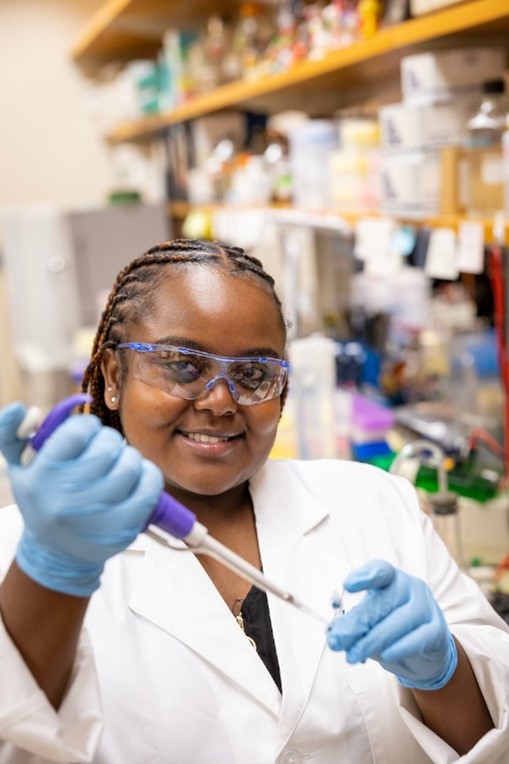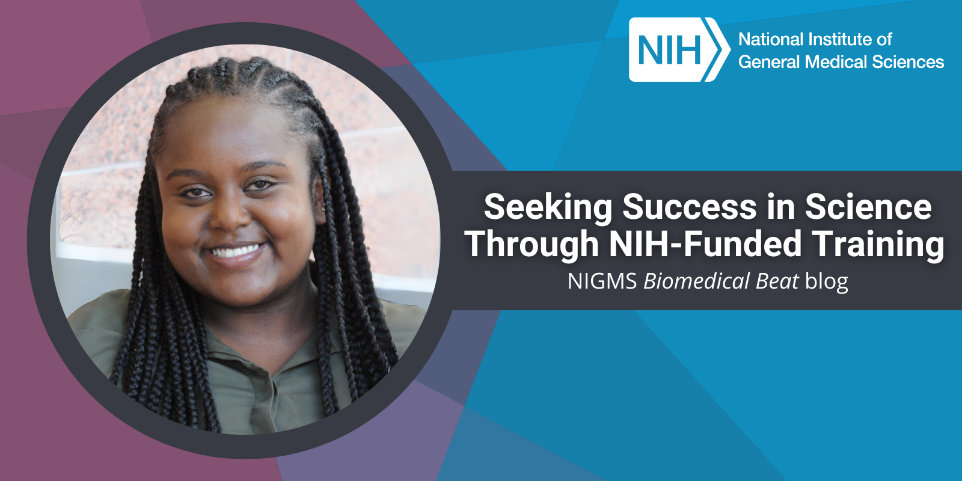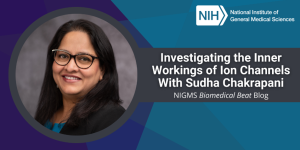
“What’s great about a career in research is that there are so many paths you can take. I get so excited for the future when I think about all the open doors ahead of me,” says Hasset Nurelegne, a senior at Emory University in Atlanta, Georgia. Hasset is majoring in neuroscience and behavioral biology (NBB) as well as English.
Since her first year on campus, Hasset has been an active participant in an NIGMS-funded program at Emory that aims to develop a diverse pool of scientists, the Initiative for Maximizing Student Development (IMSD) (which is now just for graduate students; the Maximizing Access to Research Careers [MARC] program is now available for undergraduates). The Emory IMSD has provided Hasset and other trainees with financial assistance for year-round research experiences and a support system for professional development skills and responsible conduct of research.
Exploring Research
Through her involvement with the Emory IMSD, Hasset got to know the program’s director Anita Corbett, Ph.D. She eventually joined Dr. Corbett’s research lab, where she’s currently studying histones—proteins that keep DNA strands organized within the cell nucleus. Histones play a part in regulating gene expression by controlling how easily genes can be turned on or off. Sometimes histones have changes in their amino acid sequences that affect how they control gene expression, which can lead to cancer. Hasset is studying the effects these histone variants have on cells, which may lead to a greater understanding of how the variants cause cancer in humans and the development of targeted cancer treatments in the future.

Hasset has gained research experience outside of Dr. Corbett’s lab as well. During summer 2023, she worked in a lab at the National Institute on Deafness and Other Communication Disorders with Catherine Weisz, Ph.D., studying how nerve cells in the brain and ear transmit electrical signals. This research opportunity was through the Undergraduate Scholarship Program (UGSP), an NIH program that provides recipients with financial support to cover educational expenses and places them in an NIH research laboratory for the summer. In return, recipients commit to working full-time in an NIH research laboratory after graduation for the same number of years they received UGSP support.
Through Emory’s Rollins School of Public Health, Hasset has also been active in a public health research campaign to study mental health in young Ethiopian and Eritrean people in Atlanta. The research team uses anonymous surveys and case studies to analyze people’s perceptions of mental health and well-being. Hasset’s introduction to the study was as a participant, but she soon sought out opportunities to help run the study. “I grew up in an Ethiopian household and experienced stigma surrounding mental health—its importance isn’t acknowledged in our community. So working in a lab with all Ethiopian and Eritrean people on this important topic is exciting,” Hasset says. Looking forward, the campaign organizers hope to launch an intervention program to provide mental health support to community members.
Family Inspiration
Much of Hasset’s inspiration to excel in her education and training traces back to her family. The accomplishment she’s proudest of isn’t an award or scholarship—it’s honoring her family’s sacrifices. “When my parents immigrated to the United States from Ethiopia, they left everything behind. They had to start brand-new lives and careers, but it opened new doors. Validating their sacrifices with my hard work and success has been my biggest accomplishment,” Hasset says.
Hasset is supported by the NIGMS IMSD program through grant R25GM125598. The MARC program at Emory is now supporting undergraduates through grant T34GM149511, and the new IMSD grant at Emory supports graduate students through grant T32GM148391.
Other Posts You May Like
- Understanding Signaling Through Cell Membranes: Q&A With Chrystal Starbird
- Bil Clemons: Following Scientific Curiosity
- From Science Fair to Science Lab: Q&A With Chelsey Spriggs
- Haley Bridgewater: Taking the Sting Out of Vaccines
- Investigating the Inner Workings of Ion Channels With Sudha Chakrapani







